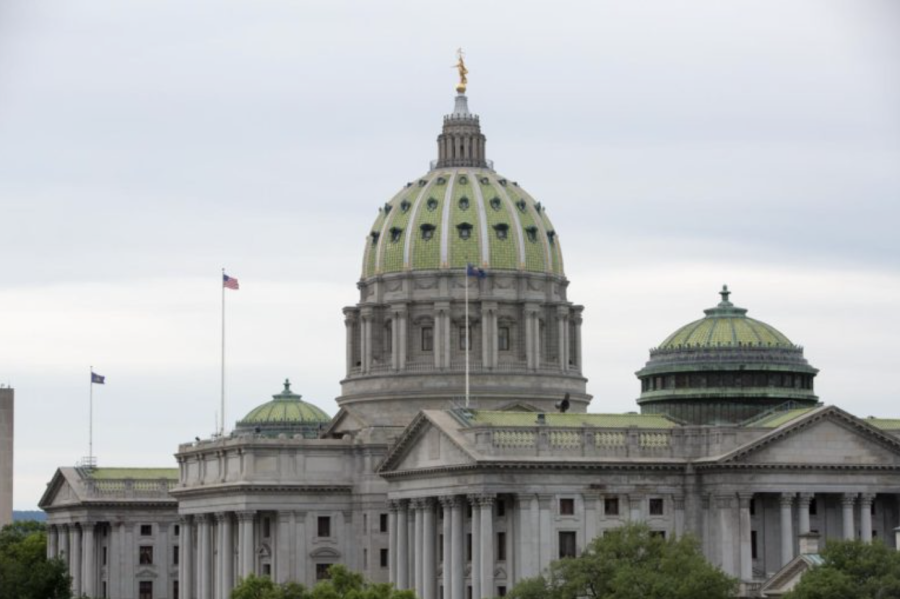Why You Should Care About State Elections
Kalim A. Bhatti / The Philadelphia Inquirer
Among many heated elections is the battle for the Pennsylvania legislature in Harrisburg.
November 2, 2022
If you haven’t noticed from the myriad of campaign signs on lawns or dozens of volunteers registering students to vote on campus, it’s election season. This upcoming Tuesday, Pennsylvanians will cast their votes for crucial and contested seats in the United States Senate and Pennsylvania governorship. These races have stirred national media attention and are likely what motivate most students to vote.
While every race and every vote has serious and unique implications for the lives of Pennsylvanians, statewide races are often overlooked, or simply ill understood, particularly in the state legislature. In fact, today’s top issues will be determined by the upcoming Pennsylvania General Assembly and Governorship. It’s important to first know how these institutions work to understand why they are so important.
The General Assembly is Pennsylvania’s legislative branch, equivalent to the U.S. Congress and is further split into the State House of Representatives and State Senate. Like Congress, it develops policy and makes laws specific to the wills and needs of Pennsylvanians. The governor leads Pennsylvania’s executive branch by advancing legislation and overseeing the enforcement of state law through various bureaucracies such as the PA Department of Agriculture or PA Department of Transportation.
The State Senate district, which includes nearly all Villanova students, will not be up for election this year. However, the 168th State House district, which after redistricting in 2020 now covers the entirety of Villanova University, has a tight race between two incumbent state Representatives, Democrat Lisa Borowski and current 168th Representative Republican Christopher Quinn. More well-known is the gubernatorial race between the Democrat State Attorney General Josh Shapiro and incumbent Republican State Senator Doug Mastriano.
While I will not delve into the policy preferences and backgrounds of each candidate, it is important to associate the names of each candidate with the roles and duties of their specific positions. In order to make an informed decision on election day, I encourage all students to explore each candidate’s campaign website and Ballotpedia.com page.
The 2022 state elections are particularly important because either party can realistically win a majority in the General Assembly and/or the Governorship. While Democrats are favored to take the governorship, consistent polling inaccuracies in past gubernatorial elections like Virginia and New Jersey imply it’s anybody’s game. Likewise, while Republicans currently hold a firm control over the General Assembly, redistricting has injected uncertainty into many races, with many now leaning in Democrat’s favor.
Thus, the saying “every vote counts” is as relevant as ever to Pennsylvania politics during this election cycle. The gubernatorial and 168th house race are both likely to be determined by a marginal number of votes. Students at Villanova will in turn play a consequential role in determining which policies Pennsylvania will pursue in the upcoming years. Most importantly, today’s most hot-button issues will be directly addressed by state-level policies.
Perhaps most obvious is reproductive rights policy, which after the overturning of Roe v. Wade has been delineated as a state-level decision. Pennsylvania’s next General Assembly and Governor will determine the legality of abortion in the state. The state’s gun policy will furthermore lie in the hands of Harrisburg. This election will determine if Pennsylvania pursues expansive policies of gun control or expands its citizens’ access to firearms. These are but two highly divisive and widely discussed topics that will effectively be determined by our state elections.
Various other topics unique to Pennsylvania will be determined by upcoming state elections. For instance, the state is the nation’s second largest producer of natural gas with drilling initiatives and regulations largely put forth by the state government. This election is essentially a referendum on whether we will satiate massive global energy demand or pursue a more progressive environmental agenda. The list of state specific issues on the ballot this year is extensive and includes other topics like election law reform, LGBTQ+ policy and education privatization.
The bottom line is that most issues on the ballot this year will be determined by who we vote for in state elections. Furthermore, the aforementioned issues all have immediate effects on how we lead our lives as Villanovans. Nov. 8 is everyone’s chance to determine the trajectory of their experience at Villanova and its surrounding community. Let’s vote, Nova, and choose the type of Pennsylvania we want to learn, work and live in.


